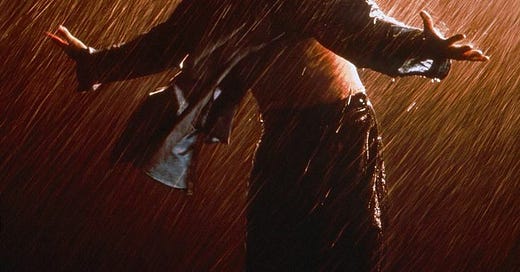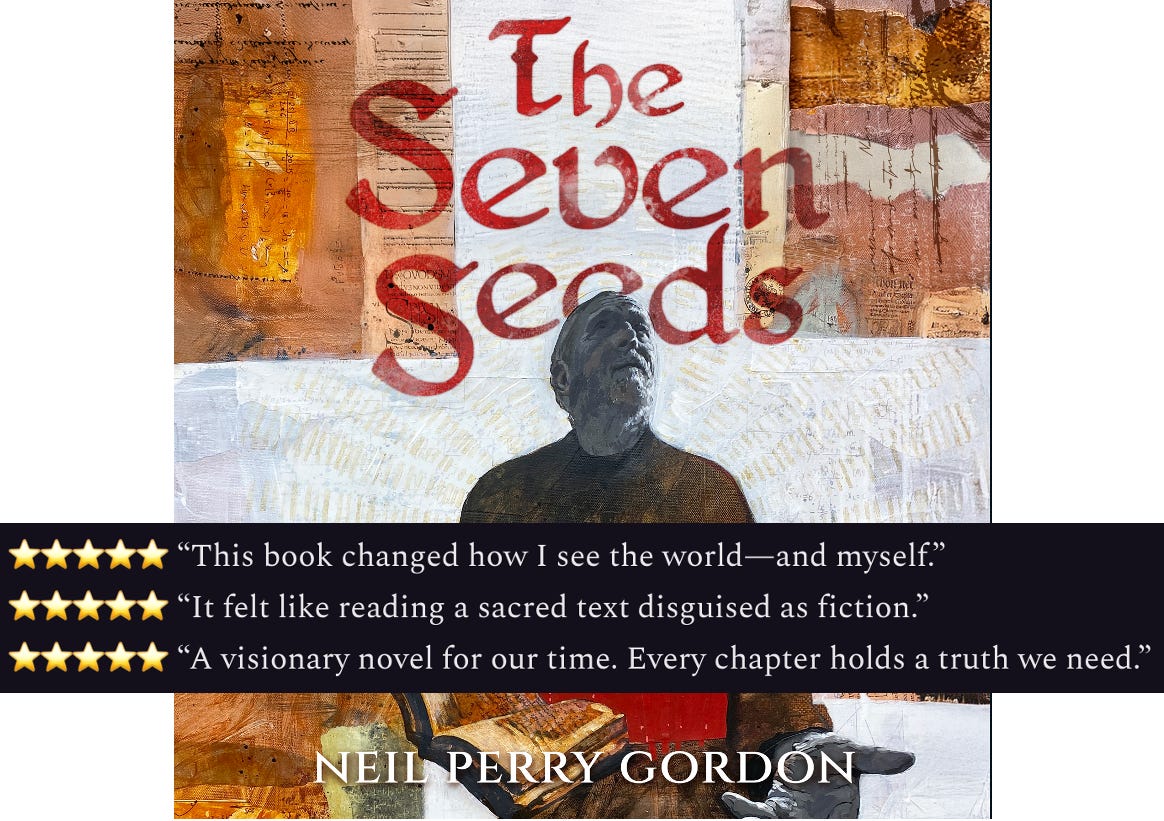At first glance, The Shawshank Redemption seems like a classic prison drama. We watch Andy Dufresne, a man wrongly convicted of murdering his wife and her lover, navigate the brutal and dehumanizing world of Shawshank State Penitentiary. There’s corruption, violence, and the slow grind of time—the kind of darkness that weighs heavily on a man’s soul.
But look again—closer, deeper.
This isn’t just a story about confinement and escape. Shawshank whispers to us about the resilience of the human spirit, the alchemy of suffering, and the mystery of hope. It’s a film drenched in metaphysical light, even as it moves through the deepest shadows of despair.
A Story of Inner Alchemy
Andy’s journey is one of inner transformation. He enters Shawshank physically free but emotionally broken—his identity as a banker, a husband, a respected member of society, suddenly shattered. Yet through the grinding monotony and cruelty of prison life, Andy taps into something far more enduring than external status: a soul-deep resilience that transcends walls, laws, and even time.
The tunnel he chisels out of his cell over decades isn’t just a literal escape—it’s a spiritual passage, a rebirth. The stone walls represent the rigid structures of guilt and hopelessness; the slow, steady chipping away is the work of inner will, like a meditator returning to the breath, or a mystic repeating a sacred mantra.
Andy isn’t escaping just from prison—he’s escaping from a world that has collapsed into meaninglessness. And when he emerges, cleansed by the rain beneath a vast sky, it’s more than a jailbreak—it’s a resurrection.
Red’s Redemption: From Skepticism to Spiritual Renewal
If Andy represents the initiated seeker, Red is the everyman—skeptical, weary, resigned. When we meet him, he’s shackled not just by the iron bars but by his own internalized belief that freedom is a myth. “Hope is a dangerous thing,” he says. “Hope can drive a man insane.”
But Andy plants a seed. Through friendship, stories of the outside world, and quiet acts of defiance—a harmonica, a chessboard, a library—Andy transmits a vibration of hope. It’s contagious, like a whispered prayer echoing through darkened halls. Red’s final journey, stepping into the unknown and following Andy to Zihuatanejo, is more than a reunion. It’s a pilgrimage. It’s the long walk out of the shadowed valley of the soul toward the ocean of possibility.
The Prison as Metaphor
In metaphysical terms, Shawshank isn’t just a penitentiary. It’s the illusory world, the maya of our conditioned existence. The inmates, the corruption, the bureaucracy—all are symbols of the walls we build around ourselves. The real “warden” isn’t the man in uniform—it’s our own fear, self-doubt, and resignation to fate.
When Andy crawls through 500 yards of filth to freedom, it’s not just cinematic catharsis. It’s the symbolic death of the false self, the ego shedding its layers of grime to emerge reborn. And when Red crosses the threshold into the world beyond—leaving behind parole hearings, shame, and fear—it’s an allegory for the soul breaking free from karmic cycles and stepping into liberation.
Hope as a Sacred Flame
“Hope is a good thing, maybe the best of things, and no good thing ever dies.” This line isn’t just sentimental. It’s a spiritual truth. Hope, in The Shawshank Redemption, isn’t naïve optimism—it’s a flame that illuminates the path through the darkest night. It’s the light that reminds us that no matter how thick the walls, how deep the shadows, there is always a way through.
In a world where we’re often locked in prisons of our own making—whether it’s fear, regret, or loss—Andy and Red’s story whispers that freedom is possible, not through brute force, but through inner clarity, resilience, and the quiet courage to imagine something beyond the walls.
In The Seven Seeds: Shepherd of Souls, readers are invited into a daring reimagining of history where the collapse of Rome—and the rise of Christianity—never occurred. Instead, Rome thrives as an eternal empire under the iron grip of mythical gods and ruthless rulers. Author Neil Perry Gordon deftly crafts a narrative that is as much about the collision of civilizations as it is about the timeless battle between power and virtue.
The story follows Pope Gregory, wrenched from the familiar sanctity of the Vatican and plunged into a world that should never have existed. Rome is unyielding, magnificent in its grandeur, but suffocating under the weight of unchecked ambition. Gregory's journey from a man of faith into a reluctant revolutionary is compelling and deeply human. The discovery of an ancient manuscript detailing The Seven Seeds—compassion, humility, forgiveness, justice, wisdom, courage, and sacrifice—offers him a beacon of hope and a roadmap to challenge the foundations of this alternate empire.
One of the novel's greatest strengths is its rich, immersive setting. The streets of this unfallen Rome pulse with life, from the opulence of imperial palaces to the dark corners where the oppressed whisper of rebellion. Neil Perry Gordon excels at world-building, blending historical accuracy with imaginative flair. The gods of conquest and power feel both familiar and otherworldly, their presence looming over every page like a shadow that cannot be escaped.
But at its heart, The Seven Seeds is a story of transformation. Gregory's mission to sow these virtues into the soul of an empire resistant to change is fraught with danger and moral ambiguity. His allies are as unlikely as they are memorable—disillusioned soldiers, rebellious scholars, and even those who once served the gods he now defies. Each character is layered with complexity, their struggles reflecting the broader themes of redemption and resistance.
What sets this novel apart is its refusal to offer easy answers. The virtues Gregory champions are not presented as simple fixes to a broken world. Instead, they are seeds—fragile, vulnerable, requiring sacrifice and relentless effort to take root. As Gregory grapples with his doubts and confronts the merciless Emperor, readers are left to ponder the true cost of change and whether it is ever truly possible in the face of overwhelming power.
The Seven Seeds is more than just an alternate history; it's a meditation on the enduring struggle between might and morality. For those who crave epic narratives that challenge the boundaries of history and human nature, this novel delivers a story that is both thought-provoking and thrilling. It's a journey that will linger long after the final page, a testament to the enduring power of belief—even in a world that has forgotten it.









I love the title of this piece "a metaphysical reading of Shawshank Redemption" - It goes on to offer a wonderful uplifting lesson about the underlying hope and resilience of the human spirit - and to show that resilience is just under the surface of the most horrifying demeaning experiences - this is one reason why going straight toward your own hidden pain in your memoir is a powerful means of finding your release from that pain. As @NeilPerryGordon says in this article, "In a world where we’re often locked in prisons of our own making—whether it’s fear, regret, or loss—Andy and Red’s story whispers that freedom is possible, not through brute force, but through inner clarity, resilience, and the quiet courage to imagine something beyond the walls."